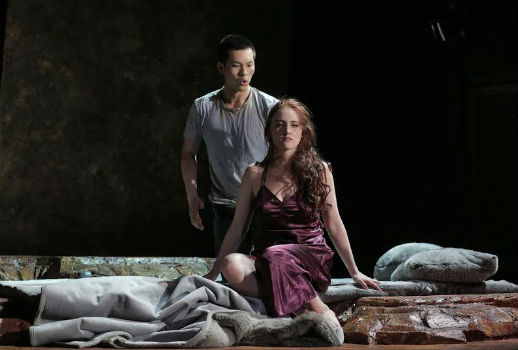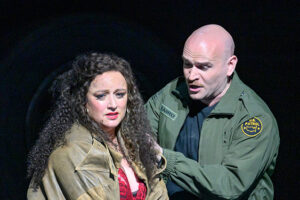

As director Mary Birnbaum notes in the program, the timing of the premiere, 1946, is significant. The war had just ended with revelations of even greater horrors than anyone had suspected. The world’s verities seemed to be teetering, the British Empire collapsing. Lucretia deals with a crime, with the conscience of criminals and the despair of their victims, with a political order that permits or ignores crime, with the morals of a later civilization brought to ancient moralities.
To the ancient Romans, the story of Lucretia’s rape by Prince Tarquinius was a caution against royal power and an exaltation of suicidal virtue. To Britten, a pacifist in wartime, fascinated by variations of innocence corrupted, the fable was more ambiguous.
Britten’s small orchestra (thirteen instruments at Juilliard, expertly led by Mark Shapiro) seems to lurch with the action in and out of traditional harmonies, now full of almost tonal melody (drinking songs, flower songs), then abruptly percussive or harshly disharmonious as less polite emotions and events are presented.
The staging took many of its cues from the multifarious texture of the score. The opera’s orchestral interlude depicting Tarquinius’ lustful ride to Rome was choreographed (by Adam Cates), and the maddened prince wielded a horse-taming bridle that he later used to “tame” the desperate Lucretia. It is a very active, theatrical staging of a piece that can seem staid. (Audible grunts during the actual rape are, perhaps, an unnecessary addition to the orchestral scene-painting.)

Rather than standing on either side of the stage as they usually do, explaining the action and providing background with, it often seems, excessive reference to the lack of Christian moral order in a story set five hundred years before Christ, the two read and interpret a book, a piece of “scripture.”
They seem to be modern congregants trying to understand the old story, explaining it to each other, insight upon insight, as well as to us. Their anachronistic ideas become contemporary notions, as the opera itself is a notion of an ancient tale. When the Chorus bring up politics or ethical dilemmas or religion, their matter does not seem irrelevant. It is an attempt to find meaning in the story.
The eight young singers do honor to the Juilliard program; it is a delight to hear healthy young voices in the small room, to understand every word (though the titles were helpful, especially during the chaotic ensemble at the work’s conclusion).
The original Lucretia was the matchless Kathleen Ferrier, but on the other hand, when the opera came to Broadway soon afterwards, the role was taken by Kitty Carlisle, a very different sort of singer. That gives us a range to fit everyone who has ever sung it.
Avery Amereau, whose rich, low alto has been garnering notice around town in Bach and Tchaikovsky (and, soon to come, Carmen), gives pleasure in the tranquil, early scenes, then, without loss of quality, shadows her voice with a bitter, despairing inflection. She means every emotion, and she’s also a beautiful woman and a fine actress.
The next most important roles are those for the Chorus, tenor and mezzo, obliged in this staging to act and move about as well as sing—during the rape, they circle Lucretia and Tarquinius, engaging in a quartet of debate rather than standing stiffly at the sides of a proscenium. William Goforth and Marguerite Jones have full-sized and gratifying voices, and sang as if moral dilemmas troubled them deeply.
Kurt Kanazawa, his baritone heartier than his slim looks, gave us a Tarquinius with second thoughts, not a total brute but eager to justify his actions to his own conscience, if only by finding someone else—Lucretia herself if necessary—to blame.
Daniel Miroslaw’s powerful bass provided a sturdy Collatinus for Lucretia to attempt to cling to when it was too late. Baritone Joe Eletto sang Junius agreeably but did not seem much struck by the ambiguities of this political character. This aspect of the drama may seem to go unexplored—but the Chorus assures us that tyrants may die but tyranny lives on. It is Britten’s caution to us all.
Amanda Lynn Bottoms sang Bianca with a pleasing tone and was able to infuse it with irony when addressing the surly Tarquinius. Christine Price sang Lucia with a sunny soprano that loses none of its fine quality or strength in high-lying music. She will bring character to heroines who can seem too light in a dramatic action.
Photos: Ken Howard






















Comments